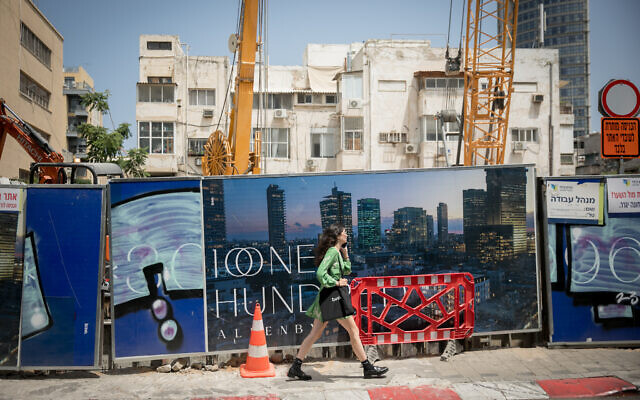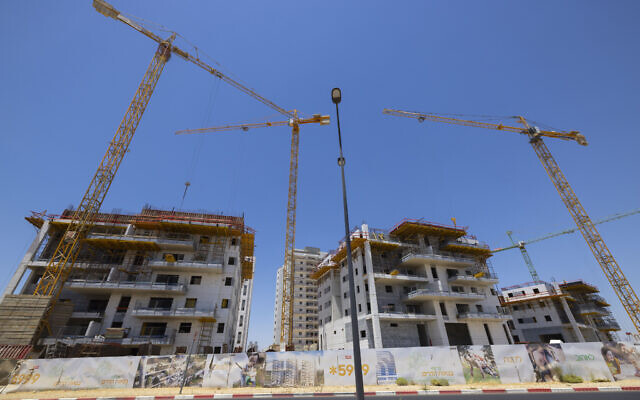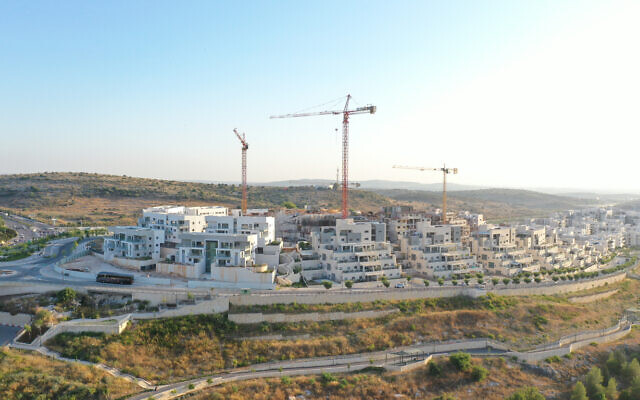Planning approvals for new housing hit multi-year high in 2022
Planning authority sees nearly 50% rise in new housing agreements, while protected spaces and green energy projects also increase

Planning approvals for new housing reached a five-year record in 2022, according to a new government report, with figures showing that 158,407 housing units were given the go-ahead over the course of the year, beating the state’s target of 125,000 units.
Approvals were up almost 50 percent from 2021, when 108,100 new units were cleared, according to the 2022 annual report (Hebrew link) from Israel’s National Planning Administration (IPA), an independent unit within the Interior Ministry that plans land use and development.
Building more homes is seen as a key tool for managing prices in Israel’s high-inflation housing market. Although prices have stabilized in recent months, they rose by around 20% in 2022.
Voracious demand for housing has far outpaced tightly controlled supply for the past 15 years or so, with chronic housing shortages and population growth driving up prices and fueling an expanding affordability gap.
According to a scathing State Comptroller report released earlier this month, state ombudsman Matanyahu Englman charged that government strategies over time were responsible for a major lack of housing and that a national strategic housing plan published in 2017 to double housing provisions by 2040 fell way behind on targets, particularly in the center of the country. The report identified a shortfall of 189,000 homes from the last 16 years (2006-2022), with the gap between supply and demand expected to grow further.
The audit suggested that a number of key plans promised in 2017 by the Israel Land Authority (ILA), Israel’s primary land owner, and the Construction and Housing Ministry were never pushed forward and that the goal of streamlining and speeding up approval processes for new homes was not met. He also said the ILA had failed to market enough land to meet building targets.

Housing prices jumped by more than 200% since 2007 due to the shortages, the ombudsman said, adding that clear action was required to increase residential construction, particularly in Israel’s central districts, Tel Aviv and Jerusalem, areas where demand is high.
Israel’s previous government had touted an ambitious housing plan for 2022-2025, which led to a jump in housing starts between October 2021 and September 2022 and a marked increase in permits for future construction for that period.
The current housing and construction minister, Yitzhak Goldknopf of the United Torah Judaism party, has prioritized growing the building pipeline but his forthcoming steps are unclear.
According to the IPA report on housing approvals in 2022, around 40% of the total number (about 66,000 units) form part of urban renewal projects that aim to densify existing areas of development. This represents an increase of around 200% on the previous year and substantially reduces the impact of new homes on the environment, in particular on Israel’s open spaces.
The Housing Ministry has already announced that a key framework for urban renewal — TAMA 38 — will be extended into 2024. Originally introduced in 2005 as a way to encourage earthquake-proofing of older buildings in key areas at risk in the north and east of the country, TAMA 38 is extensively used in Tel Aviv, Jerusalem, and the center of the country as a way of increasing the number and value of apartments in built-up areas. It gives developers additional building rights and tax breaks in exchange for upgrades to existing infrastructure.
The IPA is also working on the delivery of key projects in the industrial zone in Beersheba, in Petah Tikva, in the ultra-Orthodox city of Elad, and on the Tel Aviv/Givatayim/Ramat Gan boundaries.
According to the IPA, 2022 has also set records for the number of announcements of new national parks and nature reserves. These include the Mount Hiran Nature Reserve in the south, bordering on the Yatir Forest close to Beersheba. The reserve contains unique plant species and endangered songbirds, but was not previously officially protected from intrusive development. A marine park has also been declared off the coast of Caesarea to protect both antiquities and marine life there.
With 34 new reserve areas announced alongside the growth in housing approvals, Dror Boymel, director of planning at the Society for the Protection of Nature (SPNI), told The Times of Israel: “The data proves what SPNI has been claiming for many years — it is possible to reach a high volume of housing units, through efficient and high-quality use of Israel’s urban spaces, while reducing the need to waste open land.”
The IPA is responsible for all aspects of planning in Israel, including transportation plans, with a key role in helping to deliver on the target of having 60% of all journeys be by public transportation by the year 2040. Over the last year, the administration progressed the electrification of Israel’s fleet of buses, developing electric charging stations at key locations, and it has tried to move forward with plans for a complex and controversial metro system across the Gush Dan region.
Over 2022, the IPA also approved 32 plans for photovoltaic facilities, covering around 7,150 dunams as well as moving forward plans to deliver renewable energy from agricultural land.
Hailing a successful and busy year, the head of the IPA, Raphael Almalich, said the agency was “committed to delivering for future generations of Israelis across all aspects of its work.”










